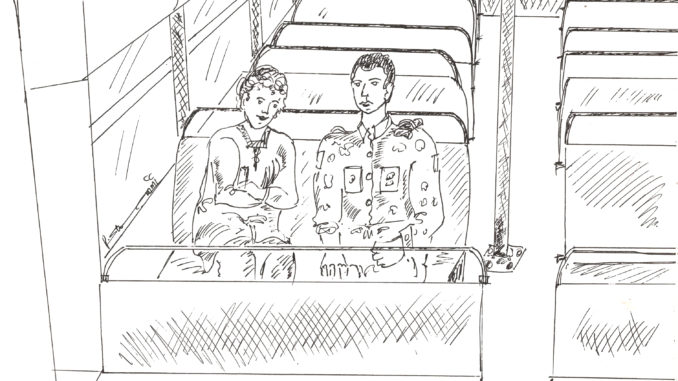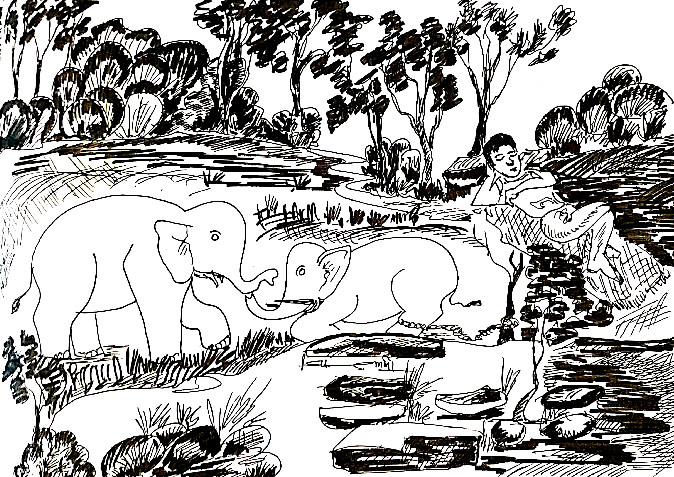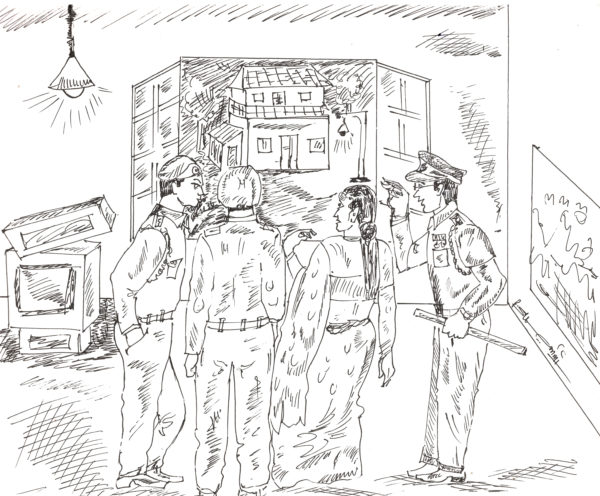
His eyes could only make out big mountains across the border. Sunrise in this border village, was more beautiful than anywhere else he had been.
⊕
Mayank remembered the sofa, which used to be placed in his room, and the brown window curtains, which were long and touched the ground. The first rays of the sun would enter his room, crossing through the pores of the curtains, adding their own colour to them.
Some voices rang around in his subconscious mind, broken voices speaking broken sentences.
A wall, which was decorated with paper dolls and stars, was still clear in his memory. Almost every thought was clear, but hazy at the same time.
Mayank, sitting on a chair, was thinking about going back home. But his home was a thousand miles away. He had been living the life of a nomad. Walking down memory lane, he entered a state where he was trying to connect his past life with his present, but the very thought of re-living it was absurd.
The cantonment area was his home now. People from the surrounding village supported him, and were with him in his hour of need. The air of this village was not strange for him now, and he was more familiar with the things here than he was with the ones at home. Most of the faces smiled at him when they saw him, and he felt an unmistakable connection.
Two years had passed since he had seen his native place.
His eyes could only make out big mountains across the border. Sunrise in this border village, was more beautiful than anywhere else he had been.
His duty as an army officer had made him busy.
⊕
ΞΞΞΞΞΞΞΞΞΞΞΞΞΞΞΞΞΞΞΞ
Sponsored Link(s)
ΞΞΞΞΞΞΞΞΞΞΞΞΞΞΞΞΞΞΞΞ
One day, while walking on a road which led to the local market, he met an old man of around eighty.
The octogenarian was one of the most renowned men of the valley, but had a somewhat hidden personality. He was an artist, and most of the time, he was found in his art studio. His art work had brought him name as well as fame, but still he preferred a simple life, away from the limelight. Mayank, being a man of practical thought and approach, had never visited his art studio.
Aquib, as the old man was named, had to leave his house quite early in life, or perhaps was forced to do so. Now a man of eighty, he did not even remember the shape of his house, the one he used to live in, before he moved to this village with his parents and two siblings.
His parents lived for a long time in this village house and died in the same. His siblings played and grew here, and were married off from this very house. Its walls were more familiar to him than the ones he had left long ago.
His house was connected to his art studio, which was bigger. The walls of the studio were full of paintings rather than cupboards.
The colours of his house seemed more vibrant with the presence of his two grandsons. The younger one was in the army, and a good friend of Mayank. Despite his frequent visits to the house, Mayank never saw Aquib’s art studio.
⊕
Mayank applied for leave to visit his home town, and a letter of acceptance was soon handed over to him. He was the only one left in his family, as his parents had died in an accident, and he was their only child.
He boarded a bus early the next morning. The bus was filled with many kinds of noises – some made by the people, and others by the engine and the songs that played in the bus. The tunes from the 90s Bollywood movies made him reminisce about the Philips player, which was his family’s most valuable asset, and was presented to him by his grandfather on his second birthday.
A boy of about twenty-two sat next to him, and was constantly talking on his cell phone, trying to make people aware of his present state. He seemed to be a trekker who had travelled a lot in the last few days. His brown hair and white skin were signs of his being a native of some hill area.
He introduced himself to Mayank, and shared his passion for travelling and his frequent trips back home. “Home is,” he said, “the place where one belongs; where love resides; one cannot do without returning home.”
With home he seemed to have fixed some importance.
“Home is the only place where you get a healthy sleep,” he added, expecting a favourable reply from Mayank.
Mayank wondered what he should say. He was suddenly out of ideas.
The young guy kept on babbling about his experiences, while Mayank remained quiet. At five feet, his body was very energetic and flexible.
Next, the young man started talking about his girlfriend. He used abuses generously; probably thought it was cool. But his language annoyed Mayank. It seemed he was talking to amuse himself than anyone else, jumping with excitement every time he spoke in the local slang, beginning and ending his sentences with the word “bhaiji” (brother).
With a strange feeling, Mayank was returning to a place to which “he belonged”.
⊕
The air felt somewhat different to what he remembered it to be like a few years back. He was still miles away from home. Night arrived, and he fell asleep. The young guy sitting next to him was still talking on his phone. Mayank’s job had helped him to adjust at any place. He had long lost the idea of comfort. He was miles away from it, as was his home.
He awoke the next morning, with the first rays of the sun hitting his face.
The chatty young man was still asleep. The bus had taken a break for breakfast. Mayank got down.
People around him were talking in local slang. The eatery, which was situated inside a busy marketplace, was overflowing with customers. People were busy with work; grocery stores were crowded with people who seemed to have come out in their night clothes. They spoke loudly and the whole place seemed like a Mumbai railway station. The traffic further added to the noise, as pedestrians pushed their way through the traffic.
Mayank again walked down memory lane, and thought of the time when he was young and would visit this place with his parents. Being short in height then, he couldn’t see much through the rush, nor feel much, except suffocation.
The bus driver blew the horn, indicating to the passengers that they should get back into the bus again. Mayank was somewhat excited now, for he was about to reach his destination.
⊕
The winds had started changing now. The cool but familiar winds were now substituted by warm and unfamiliar ones.
The young guy got off. Mayank wasn’t sure whether he would see him again or not, but he gave him a smile all the same.
The winds had started changing now. The cool but familiar winds were now substituted by warm and unfamiliar ones.
⊕
The bus reached its final destination. Mayank got down and walked towards his house.
His steps quickened and in a moment he found himself standing at the doorstep. He unlocked the door and entered.
Tired from the long journey, he went and sat on the sofa. The curtains had now faded and like the sofa, they appeared different.
His house appeared to be strange to him now. The sofa did not feel as comfortable as he had remembered it to be.
⊕
Night fell and silence enveloped the room. The house was different from the one etched in his memory. It used to be filled with noises made by the kitchen utensils, and the fights and laughter of his parents. Amidst all that rush and chaos, there was something unique —the feeling of happiness; so pure. But times had changed now.
Sometimes, the happiest moments are filled with worry and fear of losing the happiness. For, without happiness who can live? But things change within seconds, without giving any warning, leaving us with regrets or grievances, whatever we choose to call it. Only acceptance, with time, makes one comfortable with oneself – otherwise questions such as, ‘Why? Why only me? What is my fate?’ and so on will make days unbearable, and nights darker than they actually are. The outer reality is not that powerful, but it is the inner self that changes the whole course of life.
⊕
After spending a day and the following night in his house, Mayank felt the urge to talk with someone. The old neighbours were now gone. The area was filled with tenements, and people came and went as their jobs changed or when they retired. So now, most of the faces he saw around were new and unfamiliar.
Mayank found some old books, and took out a collection of short stories by one of his favourite writers, Manto. After reading for two minutes, he left his book on the table, and went out to weed and clean his garden. But he found himself returning even before he could enter the garden.
He sat for hours reminiscing about his past.
⊕
Night fell once more. His body was not tired enough, and so he found it difficult to fall sleep.
Sitting on his bed, his thoughts moved backward and forward in time. The only thing on which he could set his eyes was the moon. A big ball, as he used to call it as a kid, it was the only thing he seemed to have some connection with.
⊕
ΞΞΞΞΞΞΞΞΞΞΞΞΞΞΞΞΞΞΞΞ
Sponsored Link(s)
ΞΞΞΞΞΞΞΞΞΞΞΞΞΞΞΞΞΞΞΞ
He rose early the next morning, and waited for the clock to strike eight. It was a long wait. At eight he called Aquib Qureshi.
Aquib answered immediately. He was surprised that Mayank had called but was glad to hear his voice. Aquib realised there was something bothering Mayank.
Mayank shared with Aquib his concern about his lack of excitement on return to the place where he was born. He told Aquib that he couldn’t understand why the house in which he grew up failed to make him happy. He couldn’t fathom why he seemed to have lost the connection with the once familiar things in the house, where his parents had spent their lives— the place where each and every object belonged to him; things that he had loved and cherished.
Mayank was also surprised that he had chosen to share his feelings with Aquib of all the people. After some hesitation, he continued, “What makes things and people familiar and unfamiliar at the same time? What creates a gap between you and what is yours so wide? What is making me so uncomfortable at a place which should have been the only place of comfort for me?”
Aquib, for a moment, had gone back to his own time. These were questions he had already heard somewhere. They were not new to him and he was quite clear about the answers, but was not sure where and how to start explaining. But he finally began telling Mayank a story.
Aquib said, “A fish shouldn’t keep living in its natural habitat just to prove its belongingness. Some species have to migrate between the rivers and the sea, just to complete their life cycle. Many species fail to reach their breeding grounds and eventually die.”
Mayank had by now started visualising the story and was trying to establish a link to his situation.
“The ones who migrate in search of food and life are the ones who eventually survive,” added Aquib. “The migration doesn’t mean that their home will also change, but the idea of regretting the move, and over romanticising the past in comparison to the present, is a way of killing oneself day by day.”
Aquib stopped and waited for Mayank to register what he had said.
Mayank was now curious to know the crux of the whole thing, and Aquib continued, “The fish enter a new place that will help them survive and grow. The new place is their fate, and the move is their destiny. It welcomes them with open arms, and provides them with everything required for them to live. One should always remember that the concepts of home and belongingness are poles apart. Home doesn’t change, no matter where you live. But your belongingness is not a matter of birth. It’s a matter of the connection between the place and your inner self. Home is an outer concept about which even people will tell you, but what about the inner self? You cannot live near the sea if you belong in the mountains. The breeze from the sea will never touch you, if you are used to the cool winds of the mountains. You will never notice the sunset behind the sea if the open rays of the sun have touched you cutting their way through the mountains.”
Mayank was feeling something inside his heart. This was something which he had longed to hear. What Aquib was telling him, confirmed his own inner thoughts. Mayank’s confusion was now sorting itself out. After leading a life of a wanderer, he had finally found himself.
The strangeness between him and his house had now started vanishing, not because of some physical change, but because he had willed it to do so. The day came to an end, and he packed his bag and left for his army camp before nightfall.
He boarded the last bus, and his face carried a smile that is seen on a person’s face when he returns home.
This was indeed his return to ‘his place’; the place he ‘belonged’ to.
On reaching the camp, Mayank decided to go and meet Aquib before anyone. He knocked at the door of his art studio. Aquib opened the door and welcomed Mayank with open arms saying, “My nomad is finally home.”
Deepika Rai is a PhD research scholar at Himachal Pradesh University, Shimla. She has written a handful of short stories and research articles. Her first story "Not Until She Gets it Back" was published in The Tribune. ‘Nomad’ is her third published work. Deepika has been working as a freelance content writer for a long time. An art lover, she has also worked as a teacher, and pencil sketching is one of her hobbies. You can write to her at [email protected].



ΞΞΞΞΞΞΞΞΞΞΞΞΞΞΞΞΞΞΞΞ
Sponsored Link(s)
ΞΞΞΞΞΞΞΞΞΞΞΞΞΞΞΞΞΞΞΞ






Nice one deepika. God bless you
Thank you Sonam
Nice deepkia..very good thinking..
Thank you
My rising star. Keep it up dear and wish you all the best.
Thank you Anamika
Nic deepika…..congo.wish u lot of sucess n achievements in ur life
Thank you Manisha
What a commendable job you have done !
You have said so much in this short story which many people fail to do
Short and precise. Transformation of a confused man, who now knows his belongingness. one thing i have learnt from this story is that we do need wisdom and we mustn’t hesitate to ask for wisdom, we just need to know who our aquib is 🙂
Well done Deepika
Thank you Rishabh for a detailed review. People like you inspire me to write more.
‘Sandeshe aate hain…’, ‘Evolution with location’, ‘Har Ghar-Apna Ghar’, ‘Jaha basera, wahi hain ghar tera’…Thoughts, theme, messages of the story… Brilliant narration, apt choice of words, a simple yet eloquent tale…Congrats on writing a great piece…!!
Thank you karan
“…he spoke in the local slang, beginning and ending his sentences with the word “bhaiji” (brother).”
This one is so relatable!
“It used to be filled with noises made by the kitchen utensils, and the fights and laughter of his parents. Amidst all that rush and chaos, there was something unique —the feeling of happiness; so pure.”
The underlying idea in this line is, I guess nowadays becoming more necessary to realize.
“A fish shouldn’t keep living in its natural habitat just to prove its belongingness. Some species have to migrate between the rivers and the sea, just to complete their life cycle. Many species fail to reach their breeding grounds and eventually die.”
In the story Mayank starts visualizing the link after listening to this sentence but for me it is the crux. This quote summarizes whatever Mayank actually was missing in his life.
Story is thought provoking.One often finds himself/herself questioning the life on the basis of existentialism.
Thaks for the review. It is clear that you have read and tried to understand each and every line. I appreciate your time. Thank you.
Home is where ever the heart is. Nice story and a descent ending. Great work Dipika. Keep going.
Thank you Tanya
congratulations..very inspiring & purposefull story
Thank you so much
Recommended by a mutual friend, really liked reading it.
Keep up the good work, looking forward for new ones.
Thank you so much
There is lot in it philosophically speaking exile from self, identity crisis but then the sense of belonging. Interesting narrative beautifully weaved. Keep doin
Thank for sharing post.
Resplendent write up Ma’am!
Keep them coming!
Best wishes!